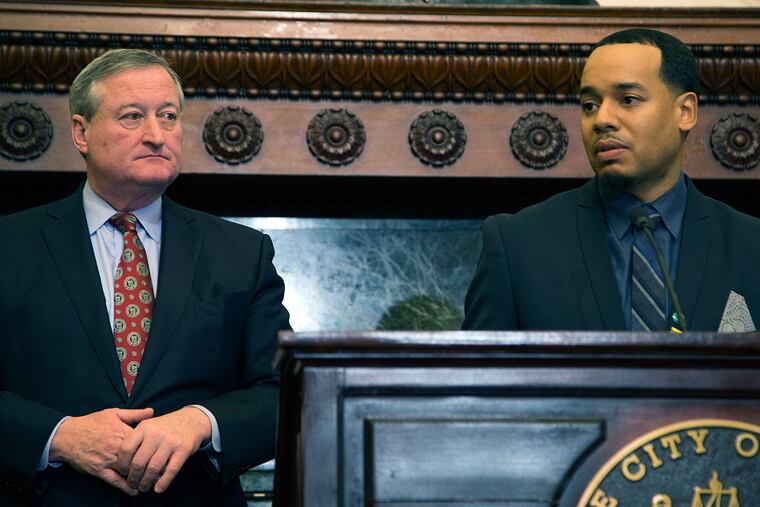Mayor’s Office of Black Male Engagement needs a makeover | Opinion
OBME is ironic: it’s nestled within the Mayor’s Office of Public Engagement but it’s been neither very public nor very engaging.

Jack Drummond, who served for nearly three years as director for the Mayor’s Office of Black Male Engagement (OBME), has departed from his position, the City confirmed to me by email on Jan. 14.
Drummond’s exit, similar to his tenure, was accompanied by minimal publicity. In that sense, OBME is ironic: It’s nestled within the Mayor’s Office of Public Engagement, but it’s been neither very public nor very engaging.
And when compared to its counterparts — the Mayor’s Office of LGBTQ Affairs, which received national media attention for creating a more inclusive Pride flag, and the Mayor’s Office of Immigrant Affairs, which since 2016 has coproduced a soccer tournament with Goya Foods called the Philadelphia International Unity Cup — OBME seems to lag behind. The most OBME, which was created in 2012 under then-Mayor Michael Nutter, has done in recent years is to host, in partnership with Community College of Philadelphia, monthly community conversations. which are sparsely attended and not widely marketed. In short, despite the support of the mayor, OBME doesn’t have much to boast about.
That’s my opinion, but City officials also acknowledge that there is room for growth.
In a statement, Sarah Reyes, the mayor’s deputy communications director, told me that in addition to recruiting a replacement, the hope is to “strengthen the office to make it more public facing, action-driven, and accessible.”
One place where OBME could make strides is in the Mayor’s Commission of African American Males (MCAAM), a committee of community leaders created under Mayor W. Wilson Goode Sr. in 1991.
No policy initiatives from MCAAM have found their way to Mayor Jim Kenney’s desk for signing, says Bilal Qayyum, who was the cochair of MCAAM when then Mayor Michael Nutter reestablished the commission in 2012 and is currently a commission member. (Full disclosure: I joined MCAAM in late 2016 but departed a few months later due to scheduling conflicts, and I was /also interviewed for the director’s job at OBME.)
To be fair, Qayyum said that in recent months, Mayor Kenney has met with MCAAM’s various committees to hear their policy ideas. And according to the Mayor’s Office, MCAAM worked with the mayor this past year in providing testimony to the Pennsylvania Sentencing Commission about its planned development of a risk assessment tool and recommended that the mayor reopen nominations for the School Board of Philadelphia to ensure that the board reflects the School District of Philadelphia’s student population.
Nonetheless, the measurable, tangible outputs of MCAAM remain minimal. It’s been about four years since MCAAM released a report detailing their work, research, and action plans. The last report was published in October 2015. and it boasted of its three main endeavors: creating legislation to ensure that the MCAAM become a permanent committee; ensuring that Philadelphia’s anchor institutions (educational and medical) provide more opportunities for black men and boys; and launching the Rebuilding the Village series.
Since 2015, MCAAM has become a permanent committee, thanks to a successful 2016 ballot initiative. And the commission did execute an 18-month series of wellness and healing conversations in three neighborhoods: West Philadelphia, Kingsessing, and Strawberry Mansion. But the desired partnerships with colleges and universities to increase equitable access has yet to fully materialize.
Drummond’s exit is the perfect time for OBME to get a makeover to increase its local relevancy and outputs.
The first step to reinventing OBME is its leadership. Drummond’s replacement must be equally well-versed in policy and ever-present in Philadelphia’s diverse neighborhoods, someone who can seamlessly navigate the bureaucracy and the blocks, respectively. And like its counterparts, OBME needs a signature event, cause, or innovation that raises its profile.
I spoke with Juwan Z. Bennett, a Temple University PhD candidate who in 2017 resigned his post as OBME coordinator, about how the office might move forward. Bennett suggests an easy step would be for the office to offer resume-building tutorials to black men looking for work.
Black men in Philadelphia — who are often overly exposed to gun violence, poverty, and questionable pedestrian stops by police — deserve an office that will be an ally and maybe even a refuge. But as of today, OBME isn’t either of those things.
We deserve a mission-driven home in City Hall. We deserve a fighter who will champion our causes. We deserve innovative solutions that will improve outcomes for black men and boys. Simply put, we deserve better than what we’ve been given.
Christopher “Flood the Drummer” Norris is an award-winning journalist, online content producer, and professional drummer who is CEO of Techbook Online, a Philadelphia-based news and event company, and the host of the Drumming for Justice podcast.